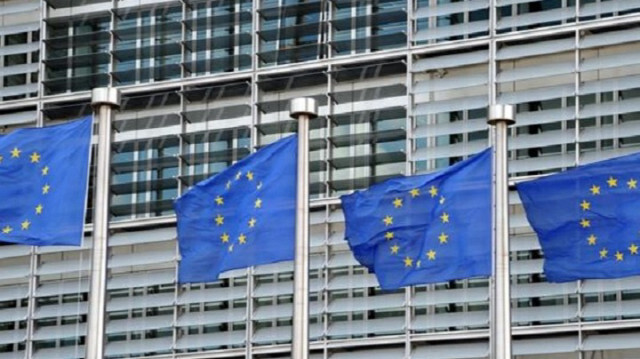
Agreement emerged following calls from Greece, other EU countries for mechanism requiring inland states to share responsibility of hosting asylum seekers
On June 14, the world woke up to the harrowing news of the drowning of hundreds of people off the coast of Greece. Most of those killed in the Mediterranean Sea are believed to be economic migrants from the Global South who were making the dangerous journey for a better future.
As the tragedy unfolded, human rights organizations all over the world pointed to the urgent need for a policy mechanism to minimize such tragedies in the future.
A week before the Greek drowning, the EU agreed for a common asylum policy — coming after nearly a decade of deliberations — a week before the Greek drowning tragedy that focuses on the rules of processing asylum applications in light of how the states share responsibilities in taking care of the asylum seekers once they have entered the border under jurisdiction.
"Hugely significant step" for the EU on migration, said European Commissioner for Home Affairs Ylva Johansson. German Interior Minister Nancy Faeser called the agreements "not easy decisions for all, but historic."
- What does the agreement say?
The policy heavily focuses on EU countries sharing the hosting of asylum-seekers, mainly in Greece and Italy on the bloc's rim.
EU nations refusing to accept refugees from those countries must pay €20,000 ($21,000) per person into a Brussels-managed fund.
Support for the proposals was not universal across the bloc, with Poland and Hungary voting against them and Bulgaria, Malta, Lithuania, and Slovakia abstaining.
Though not legally binding yet, the deal enables parliamentary negotiations on legislation, expected before the next European elections in June 2024.
It also mandates fast-track border procedures for arrivals from countries deemed safe, to facilitate returns.
Belgian Secretary of State for Asylum and Migration Nicole de Moor has reportedly said that people from "Morocco, Algeria, Tunisia, Senegal, Bangladesh and Pakistan" had statistically less chance of gaining refugee status.
The EU is party to the 1951 Refugee Convention, allowing asylum or returns to a third country. The deal calls for implementing the safe third country policy by 2026.
Samar Abbas, a lawyer based in Pakistan with an expertise on refugee rights in Europe, believes that the safe third country policy is far from reality as terms for returns and engagement remain undiscussed between the EU and third countries.
"The EU is mandated and responsible to rescue and help those who have reached its border irrespective of their nationalities," Abbas said.
- Danish policy on EU agreement
Meanwhile in Denmark, authorities have not expressed an official position on the policy. But in the past, the country has maintained that it wants to collaborate with other EU nations on transfering asylum seekers outside the bloc while their applications are pending.
Migration and Integration Minister Kaare Dybvad said in January that Copenhagen suspended talks with Rwanda as it seeks EU support.
"We are not holding any negotiations at the moment about the establishment of a Danish reception center in Rwanda," Dybvad told Danish media. "This is a new government. We still have the same ambition, but we have a different process," he said.
- Cost-sharing, not rehabilitation
Abbas believes the agreement focuses more on cost-sharing than refugee rights and well-being.
"If we look at the document and its direction, it is pretty much clear that the agreement is not focused on the refugees or asylum seekers but responding on the demands of the EU countries to get funds to accommodate refugees," he said. "Every EU country will want to be a beneficiary of this scheme that involves millions of euros. Hence the focus is not on the rehabilitation but on the economic gains.”
Eva Singer, director of asylum at the Danish Refugee Council, said EU nations remain skeptical of refugees, taking years to agree because they wanted different policies.
"If you look at overall case scenario, you will see that there is an increasing majority of the EU countries who wants to control the outer borders more on what is happening now. And with more controls, there is always a risk that people's human rights are going to be violated."
Singer said diplomatic help, support, and assistance for refugees — possibly through the UN organizations like the UNHCR — were long overdue.
"I don't think that will stop people from crossing the Mediterranean Sea through dangerous journeys, but we need to provide as much as possible alternatives so that people can travel more safely and also as Europe is in close cooperation with other countries it needs to ensure more safe, legal routes to the migration."
Abbas, however, said that with the current right-wing political trend being observed all across the Europe, it is wishful thinking that safer, more secure passage for migration will be available to people from the Global South.
"With the conflicts and climate change affecting the daily livelihood of the people, it is natural that the people will seek better opportunities to save their lives and livelihood in Europe. It is pertinent for all that the refugee and asylum seekers are seen in more humane way than an opportunity to squeeze as much financial opportunity as possible."
Hello, the comments you share on our site are a valuable resource for other users. Please respect other users and different opinions. Do not use rude, offensive, derogatory, or discriminatory language.
The floor is all yours.








